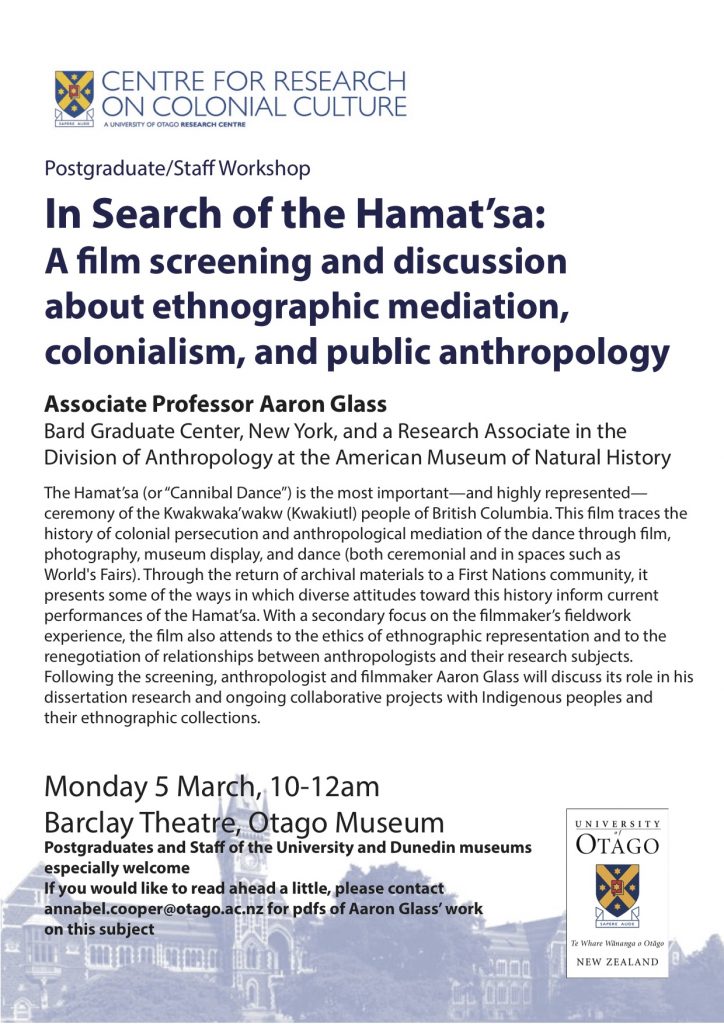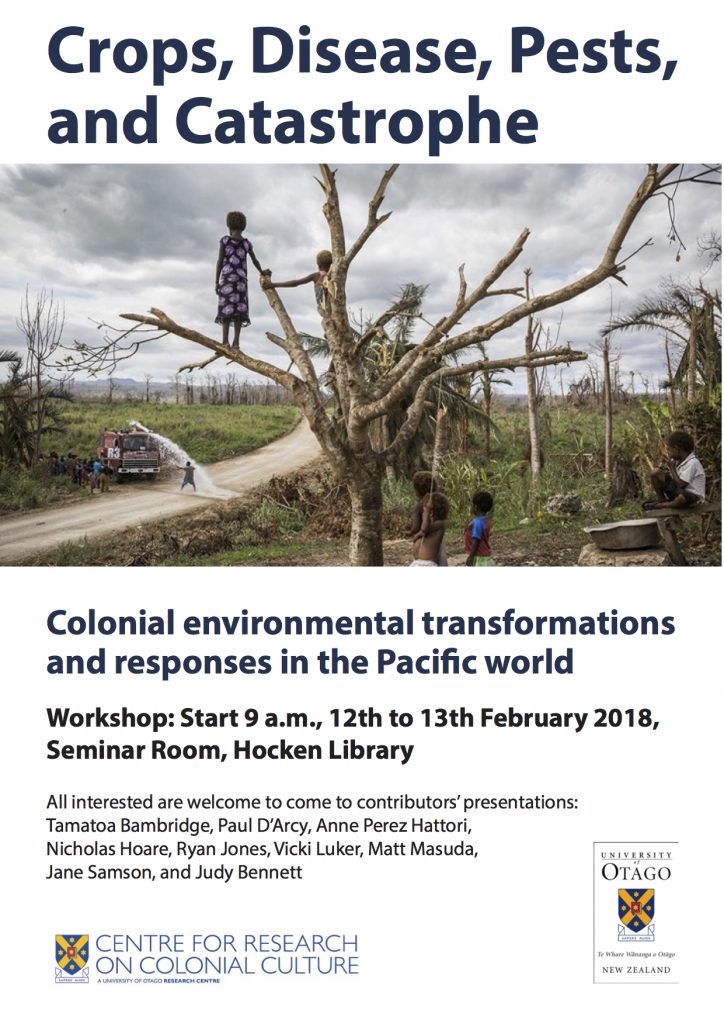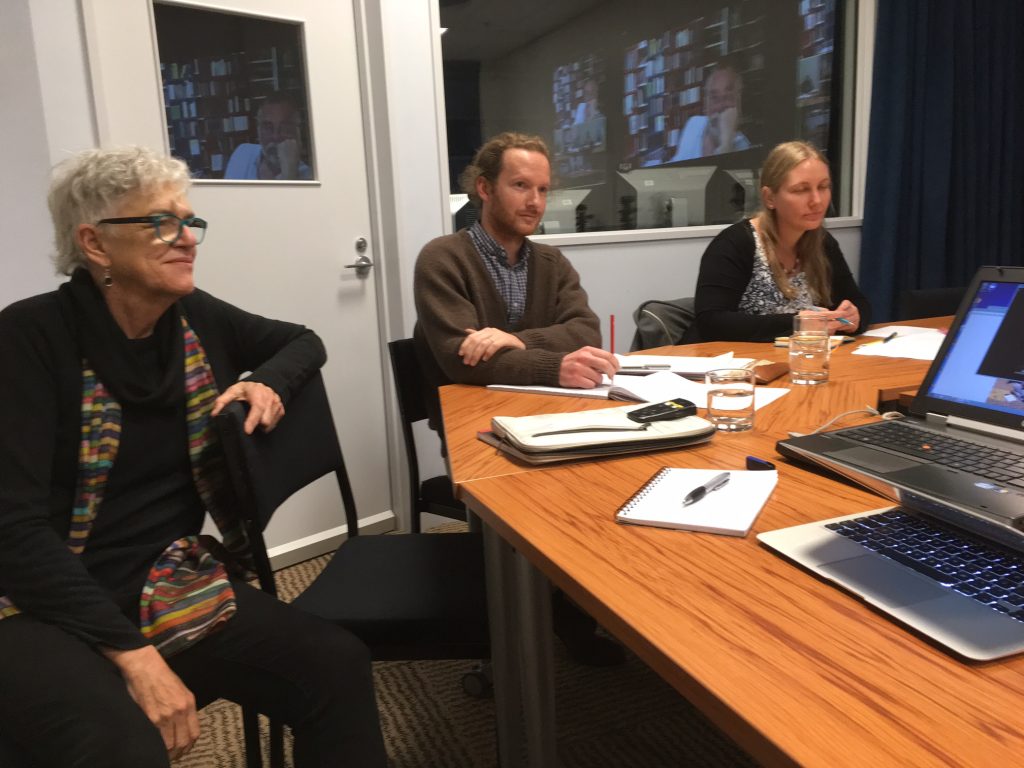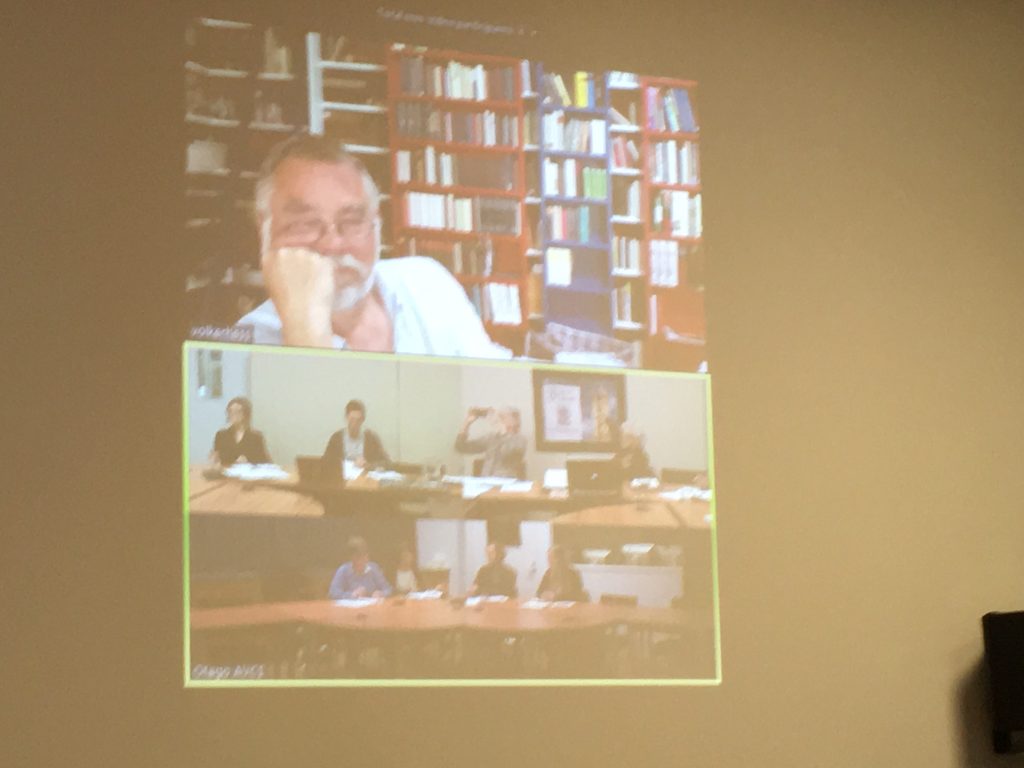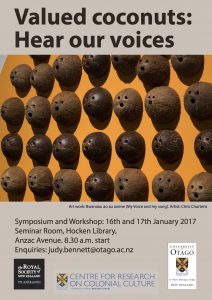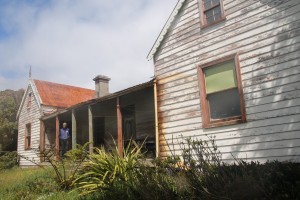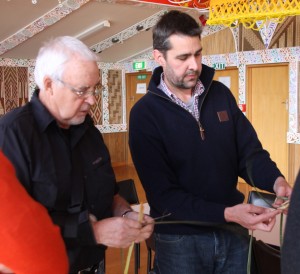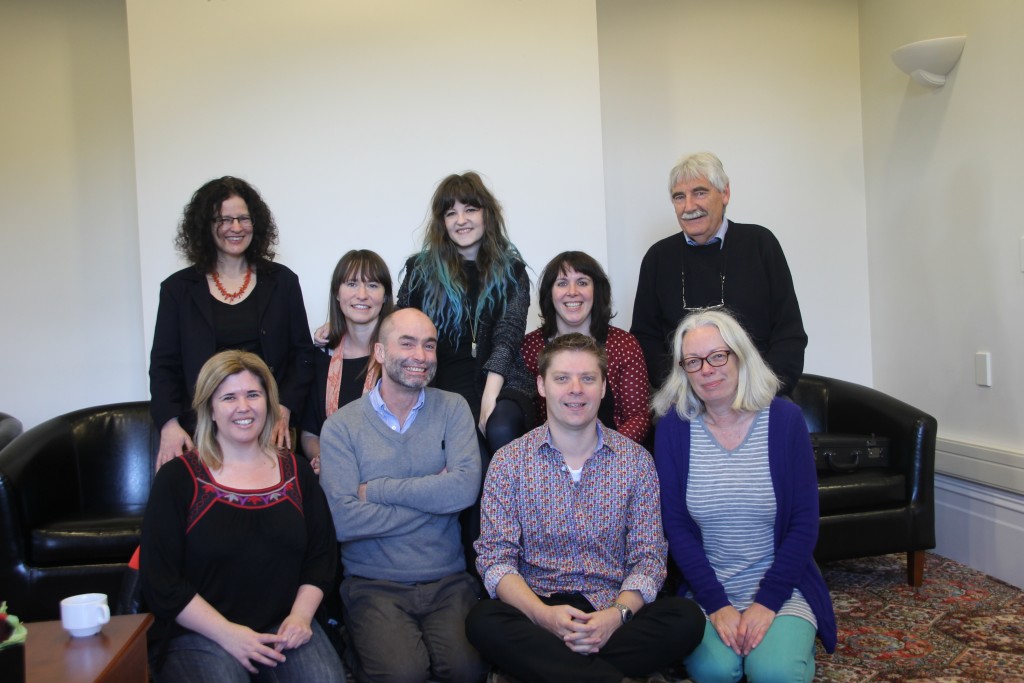Film screening and workshop
During his visit to the University of Otago, Associate Professor Aaron Glass (Bard Graduate Center, New York) will lead a workshop discussing his engagement in film as part of critical anthropology, the ethics of ethnographic representation, and collaborative research. All welcome. Details are below.
Crops, Disease, Pests and Catastrophe
The Centre is pleased to be sponsoring an important workshop on new approaches to environmental history in the Pacific World. Co-convened by Centre member Judy Bennett and Paul D’Arcy (Australian National University), this two-day event takes place from 12-13 February at the Hocken Library Seminar room. It is free to attend and open to the public. If you are interested in attending please register with Judy Bennett [judy.bennett@otago.ac.nz]
Mapping Workshop
Centre member Jane McCabe has had a busy year. In May her first book was published, and officially launched the following month. It’s been well-received and getting some great media attention including a spread in the Dominion Post, as well as on the New Books Network. Jane also started a new project in February.
Rural history is at the heart of her Marsden Fast Start project entitled ‘Splitting up the Farm? A Cross-Cultural History of Land and Inheritance in Aotearoa’. In late June she hosted a mapping workshop based around that project, which was supported by the Centre for Research on Colonial Culture. The one-day workshop brought together experts in rural history, land titles and mapping to discuss best practice in use of maps and land titles in order to help Jane as she works towards the production of effective visual outputs for the project. Jane began the day with a presentation in which she set out the research questions and aims for her investigation of familial land transfer in two districts (Taieri and Hokianga) from 1870 to 1970. This helped set the framework for the workshop and focus discussion on the advantages and disadvantages of land titles for a project about cross-histones of land use and inheritance. In order to foreground the land, and attitudes to it, Jane proposed a survey of land titles/ownership to show change over time, with the aim of collating data for communication on a digital platform.
Participants discussed the value of maps in helping think about the past spatially. One inspiring suggestion was that project participants might be encouraged to draw maps of their farms so that familial and individual approaches to land use could be illuminated, thereby providing a multiplicity of voices to land use that does not rely on official maps and land titles. Personal mapping might also enable social and cultural data to be mapped that might look different to official data, detailing how families members who might not be named as owners in fact worked and used the land. Later sessions discussed land titles and their value as historical sources for mapping land ownership over time and cross-culturally.
The Centre thanks Jane for hosting this event and all the participants for sharing their expertise: Malcolm McKinnon, Michael Roche, Jonathan West, Brian Coutts, Vivienne Cuff, Michael Stevens, Hugh Campbell, Tom Brooking, Michael Stevens and Angela Wanhalla, as well as Karen Craw for kindly showcasing the Hocken’s map holdings relating to the Taieri.
The Centre has been busy hosting a number of workshops this year, and have many more on the horizon. There’s a whaling history symposium in late June 2018 in Honolulu, for instance, along with plans for an event on Māori writing in November 2018, as well as a possible workshop on rural history in late 2018. Watch this space for further details.
Archival Files and Knowledge Production Workshop
The Centre hosted a very successful workshop on May 30 & 31, organised by Barbara Brookes, addressing the creation of archival files, the way individual lives get written into such files, the serendipity (or otherwise) of the survival of such paperwork, how it gets ordered, and how such files might make it possible to create claims on the state. Participants also considered the origins of files in book-keeping work and their ongoing life in the digital realm and asked how different forms of accessibility might alter our engagement with files and what might be lost when the original ordering becomes subservient to digital imperatives, such as the great demand by genealogists.
The writing of history is shaped by its sources. Workshop participants spent two days thinking about how those sources shape narratives within institutions, at the national level, and for the individual. Jane McCabe, from the Department of History and Art History at Otago, linked an institution, a number of countries and personal narratives in her paper which is based on an archive that continues to shape lives in the present. Rosi Crane, an Honorary Research Fellow at Otago Museum and a graduate of the Department of History and Art History at Otago, who has been working on the project for Barbara, attended and presented her thoughts near the end of the workshop.
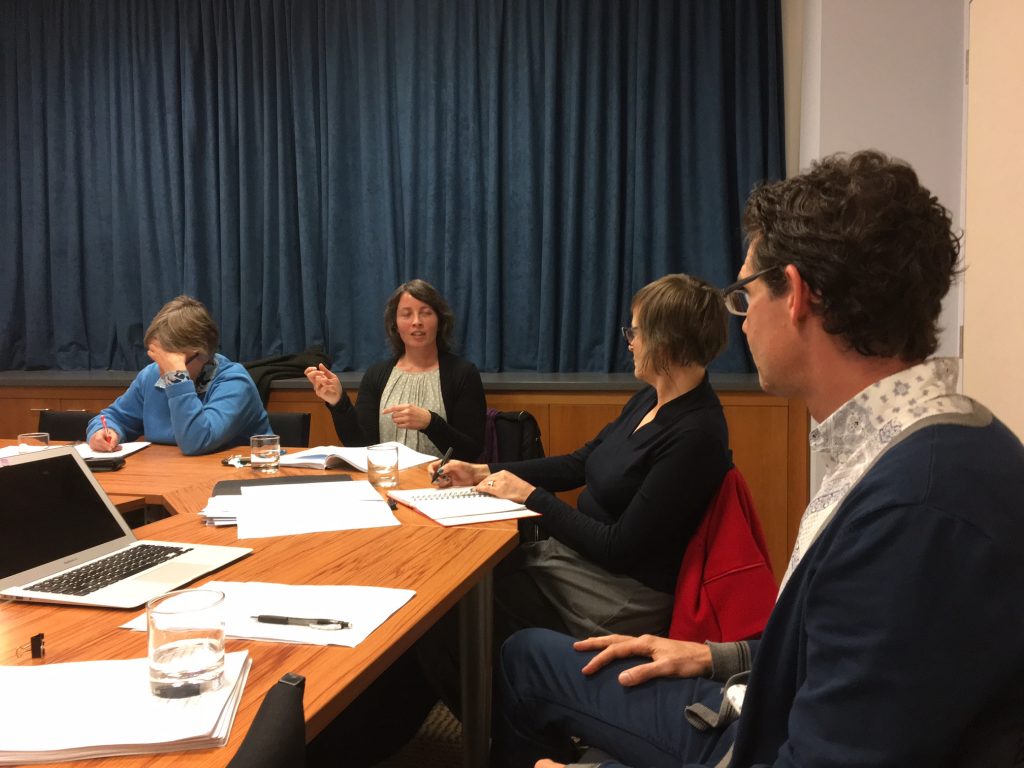
Rosi Crane takes notes as Jane McCabe discusses her paper while Kate Hunter and James Moran listen attentively.
All workshop participants considered this on-going relationship with archives, how historians use them to create coherent stories and how paper trails both serve to highlight some kinds of knowledge and elide others. The Centre was delighted to welcome to the Otago campus James Dunk from the University of Sydney, James Moran from the University of Prince Edward Island, Sally Swartz from the University of Capetown, Kate Hunter and Rebecca Lenihan (with Charlotte Macdonald there in spirit) from Victoria University of Wellington. and Volker Hess, from the Charité – Universitätsmedizin Berlin, who joined the workshop by zoom for three hours of intense discussion of pre-circulated papers.
Congratulations to Barbara Brookes on putting together a fantastic programme of speakers. We look forward to seeing the publication of these papers in a special journal issue in the near future.
Valued Coconuts
Scholars in Pacific history and culture met to share their knowledge on the use and economies of the coconut in a symposium on Monday and Tuesday this week in Dunedin, the first event in what looks like a busy year for the Centre. Professor Judy Bennett organised and hosted the Valued Coconuts: Hear Our Voices symposium and workshop as part of her Marsden project, Constant Coconuts: A History of a Versatile Commodity in the Pacific, and with support from CROCC.
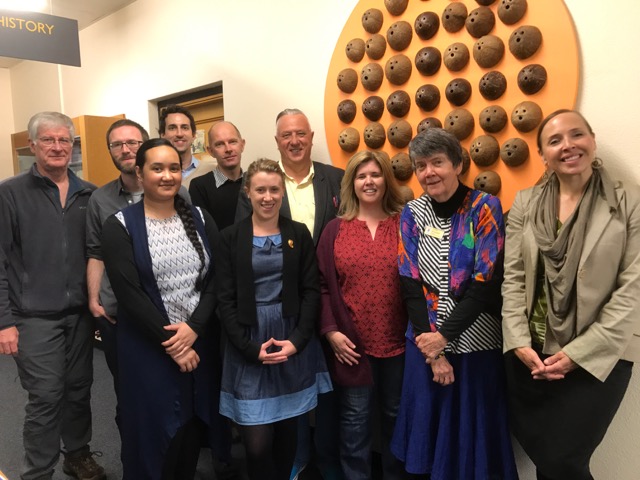
From left: Steve Talley, Josh Levy, Toaga Alefosio, Holger Droessler, Adrian Muckle, Kate Stevens, Lachy Paterson, Angela Wanhalla, Judy Bennett and April Henderson.
Valued Coconuts was a pre-read workshop featuring six papers. April Henderson and Toaga Alefosio’s (Victoria University of Wellington), On Skin and Bone: Samoan Coconut Oil in Indigenous Practice discussed how coconut oil is used in the continuing Samoan practices of fofō (healing massage), samaga (tattooing) and liutofaga (cleaning of ancestors’ bones) and the meaning for people today. This paper comes of out of summer scholarship for Toanga (who will be an Honours student this year) and April’s current research on virgin coconut oil use, “Kernals of Hope: Following Coconut Commodities from the Pacific to the West” supported by a Royal Society of New Zealand Marsden grant. In the second paper, Wasting coconuts? Consumption versus commerce in Wallis and Futuna, Kate Stevens discussed how French colonisers’ desire for scientific production of copra clashed with the Indigenous people’s views on the value of coconuts. Kate is a postdoc in Otago’s Department of History and Art History, working with Judy on their Marsden project.
Josh Levy is a PhD student at University of Illinois, Urbana-Champaign, who is researching the successive colonial regimes on Pohnpei through food history. His paper, Ideal coconut country: Persuasive coconuts and the scientific plantation in Pohnpei, Micronesia, looked at the German colonial period and the effects of copra production on the Pohnpeian population. Steve Talley, an Otago PhD student’s paper set to Defining indigenous entrepreneurship in the New Hebrides copra trade, and how the opportunities and constraints of the French and British rule moderated the Indigenous peoples’ engagement in the coconut trade.
Holger Droessler‘s Coconuts in Samoa explored how the cultivation of coconuts and production of copra mediated the German colonisers’ attitudes to Samoans, and how Samoans were able to maintain a subsistence economy despite the German desire for greater productivity. Holger is a Visiting Assistant Professor of History at Bard College in New York state. In the last paper, Judy Bennett’s Voices of Rotuma: Enduring Refrain examined the copra trade of Rotuma both in the colonial and post-colonial eras and tensions brought about through the necessity of having to ship its copra through Fiji.
Centre members, Angela Wanhalla and Lachy Paterson, acted as commentators for these papers alongside Adrian Muckle from Victoria University of Wellington. The format of the symposium allowed for extensive discussion of the papers; the plan at this stage is for all the papers to be incorporated into a special journal issue. Thanks to the Hocken Collections for providing the venue for the event, and for the tour of some of their Pacific material. Thanks also to the Otago Museum for a tour of some of its coconut-related holdings.
He haerenga ki Awarua
On Thursday 29th, CROCC member Michael Stevens hosted a number of fellow members, and other guests at his home marae, Te Rau Aroha, at Bluff, to look at Māori/maritime history and how this aligns with Michael’s Marsden-funded project, A World History of Bluff.
As well as visiting a number of the locales that inform Michael’s work, we were also able to give short presentations to local people at the marae on the Thursday evening. These included: Atholl Anderson (Retired, ANU): “Archaeology in the Southern Margins”; David Haines (Waitangi Tribunal): “Tuhawaiki’s Cannon”; Tony Ballantyne (Otago): “An Indian Sailor in the South”; Jonathan West (OTS): “A triangulated moment in the Tasman Triangle: Port Pegasus, 1826”; Angela Wanhalla (Otago): “‘Granny Harrold’: The Transnational Life of an Indigenous Woman”; Lachy Paterson (Otago): “Southern Kāi Tahu and Māori-language newspapers”; and Jane McCabe (Otago): “Kalimpong Kids in Southland”. Regular draws also saw a number of books given to attendees.
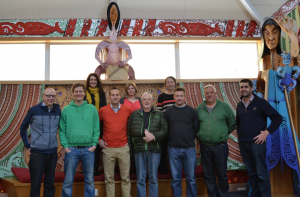
From left: Tony Ballantyne, David Haines, Frances Steel, Ryan Jones, Angela Wanhalla, Atholl Anderson, Jane McCabe, Jonathan West, Lachy Paterson, Michael Stevens.
There were several highlights. Serendipitously Sir Tīpene O’Regan, the upoko of the local Awarua Rūnaka was in town, and kept us entertained with stories on the Friday night. And on Saturday we were lucky to visit Stewart Island and visit several historical spots, including the “Travellers Rest”, a boarding house run by a Agnes Harrold, a nineteenth-century Metis woman from Manitoba. A big thank you to Michael and his whānau for their hospitality, and the ringa wera at the marae who kept us so well well fed while we were there.
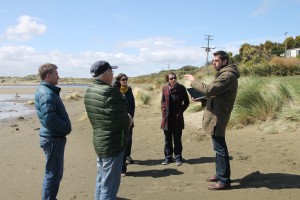
Trying to keep warm at Omaui Beach. Not only a site of shipwreck, but of the long and continuing presence of a number of Kāi Tahu whānau.
Seminar on “Digital Interventions”
Apologies for the late notice. Dr. Tim Sherratt, one of Australia’s leading scholars of digital humanities will be talking today 1.00-3.00pm about some of his current projects, and explore some useful digital tools, in the Science Library Seminar Room (Ground Floor, University of Otago Science Library). Dr Sherratt works both as an academic at ANU, and as part of the management team of Trove – Australia’s version of our Papers Past. Click here for more details.
New Zealand’s Sexual Histories
Over the past two days a group of scholars have been talking about sex, and New Zealand’s sexual histories in particular. Angela Wanhalla and Chris Brickell, both Centre members, co-convened this event, funded by a Rutherford Discovery Fellowship and the Centre for Research on Colonial Culture, which brought together 10 scholars for a pre-read workshop at St Margaret’s College on 1 & 2 July. Participants discussed the benefits and limitations of demographic approaches to the study of sexuality (Hera Cook), New Zealand’s anti-masturbation movement (Lindsay Watson), the Health Department’s sex education pamphlets (Claire Gooder), non-monogamy and swinging in post-war New Zealand (Lily Emerson), sexuality and morality in colonial Otago (Sarah Carr), sexuality and infertility (Jane Adams), intimacy, desire and friendship in young people’s diaries (Chris Brickell), and childbirth on migrant ships (Ali Clarke). Professor Matt Cook (Birkbeck) also participated in the workshop, in addition to giving a beautiful and elegant public lecture based on his latest book, Queer Domesticities: Homosexuality and Home Life in Twentieth-Century London (Palgrave, 2014). A special issue of the New Zealand Journal of History based on the papers presented at the workshop will appear in 2016. And we highly recommend you go listen to Professor Matt Cook talk about his new book at Victoria University of Wellington on Monday 6 July. Find out more about his talk here.

